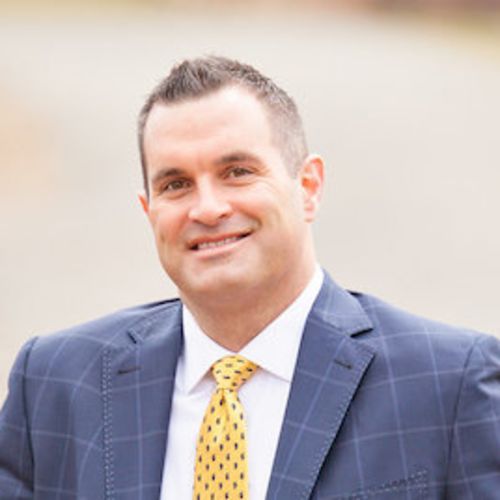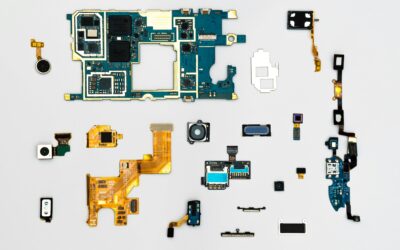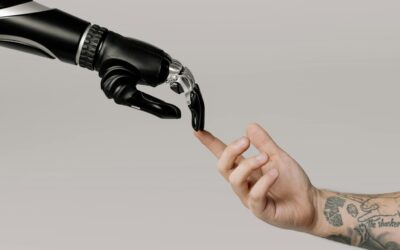A Cash Flow Revolution with David Mozeika
Could a simple shift in how you manage cash flow unlock your financial success? David Mozeika talks about how to supercharge your savings rate!
Listen to us On
About the Episode
We focused on shifting the way we think about and manage our cash flow, how a simple shift from a spending account to a savings account can improve saving’s rate by 6Xs, why so many of us struggle to get ahead financially, and how to position yourself for financial success, with David Mozeika, Founder of Currence, and top Financial Advisor.
Listen to hear a difference-making tip on how to start putting yourself and your family first when it comes to your finances!
You can learn more about David at LiveCurrence.com, Instagram, Facebook, and LinkedIn.
Did you get anything out of this episode? Do us a solid and leave a review:
https://ratethispodcast.com/alignedmoneyshow
Learn more and engage at MoneyAlignmentAcademy.com, Twitter, LinkedIn, Instagram, YouTube and Facebook.
Buy George G a coffee (he loves coffee)
https://www.buymeacoffee.com/lifeblood
Have George G speak
https://moneyalignmentacademy.com/speaking/
Financial literacy and wellness for individuals, families, and companies
https://moneyalignmentacademy.com/
Find George G’s books here
The Aligned Money Show is the podcast for Money Alignment Academy, copyright 2024.

George Grombacher
Host

David Mozeika
Guest
Episode Transcript
george grombacher 0:02
David, to get us started, give me two truths and a lie, please, sir,
David Mozeika 0:06
sure. I played college football in the 90s. The late 90s, I have golf with an Oscar award winning actor and my family and I just came back from an amazing Caribbean cruise to the US Virgin Islands.
george grombacher 0:24
Wow. College football in the 90s, golfed with an Oscar winner, and just got back from a cruise. I should have looked at a picture of you from last week to see if you’re Tanner, because that probably would have helped. Or maybe you’re just a really responsible person, and you wore a hat or sunscreen, let’s see you look like a big guy. So I believe the football, the vacation one is tricky on the golf thing, man, I gotta guess you didn’t just get back from vacation on a cruise.
David Mozeika 0:58
You are absolutely correct. Yes, I I would rather get a root canal than go on a cruise. There’s just so much opportunity for error, right? Like, there’s so many things that can go wrong. The rooms are really small. They tell you when to eat, when to get on the boat, when to get off the boat. Like, that’s not a vacation for me. You know, I live such a highly structured life, like all week long, that if I’m gonna decompress, the last thing I’m gonna do is have somebody tell me what to do all the time and be really vulnerable out at sea. It’s just not for me.
george grombacher 1:36
That’s amazing. I I’ve never considered that, but I echo all of those, all of those reasons to not go on a cruise. Now, yeah,
David Mozeika 1:44
we went couple years back, my parents took us on a it was like the family trip. She, you know, my kids were little, and I said, Let’s go do a family trip on a Disney cruise and, and, I mean, I stubbed my toe like 17 times in the tiny, little room that we’re in. And, you know, the best part of the whole thing is, when you get to the Disney Island, you can actually, like, you know, feel like, have your feet touch the ground. I’m like, I will never, ever, ever do this again, even if you paid me
george grombacher 2:11
there. It is perfect. Yeah, all right, yep. So anything else, are you interested in going to the beach? Do you want to go to the mountains? Yeah, I
David Mozeika 2:21
like the beach. I like the beach. I live near the beach. So, you know, it’s something when you live near the coast, you kind of always live near the coast, or need to be, even if I don’t go just knowing that I’m there, I don’t know. So it’s an interesting phenomenon. As people that live near the beach, they kind of always live near the beach. I think
george grombacher 2:38
that is interesting. And college football, what position did, did you play inside linebacker? Truly,
David Mozeika 2:44
not that great of a story. It was division three college football, and you can’t tell on Zoom, but I’m actually only five foot seven, so, you know, Penn State and Alabama were not calling, but I love football. And you know, coming out of high school, that’s like, was the most important thing to me, is just to continue my football career, and it was a great experience. I wouldn’t give it back. And you know, you know, football is just big part of my life, yeah, well,
george grombacher 3:10
appreciate that it’s no whatever level to compete. At the collegiate level is an awesome thing, so nice work. Tell me about the golf
David Mozeika 3:20
so I picked up golf late in life, and and then I joined a golf club, and believe it or not, Joe Pesci was a member there, so he was just always hanging out. And I gotta say, he’s a good fella. And then we played a lot of golf together. It’s good time. Nice.
george grombacher 3:33
Tall is Joe Pesci?
David Mozeika 3:35
He makes me look tall. Okay. Yeah,
george grombacher 3:41
everybody’s impression, yeah,
David Mozeika 3:43
and honestly, he’s great man. And like meeting him and like hanging out with him in the social environment, you know, is exactly who he is on movies, but that’s just like, really who he is. That’s pretty cool.
george grombacher 3:53
Totally cool. Yeah, awesome. Well, those are well done. Appreciate it. What is, what is top of mind for you right now.
David Mozeika 4:03
Top of mind for me is, I feel like there’s a real challenge and epidemic in how people are controlling their money, the lack of control that people have, the lack of savings, you know, the if you look at the Federal Reserve numbers, I think the most recent ones would suggest that people, or, you know, the American savings rate, the average savings rate for Americans, is 2.9% and you know, the challenge is that people’s people feel like there’s something wrong with them, as if it’s their fault. And what we’ve learned is that people don’t have a savings rate problem. We have a flow of funds problem, which means our money’s flowing in the wrong direction.
george grombacher 4:50
What does that mean? What does
David Mozeika 4:52
that mean? What does that mean is that we’re taught to spend our money before we save it, and the default of every dollar we have so. Uh, you know, the the tip is, stop sending your paychecks to your checking account. You know, our checking account is really just a conduit for spending. You know, our checking accounts are really expense accounts. They’re designed for spending money. They’re designed for paying bills. It’s where Amazon shows up. It’s where all the subscriptions show up, and it’s all that spending environment, and what happens is people are taking their hard earned money. The money is that we trade time for right? You’re trading time for money. You’re earned income, and we’re putting it into this environment that’s created by the checking account we spend before we save. And then you have to fight that gravity to put money away. It takes a lot of intentionality, a lot of manual effort to save money, because it’s the afterthought. And I believe that the direction of your money in, which way it flows, will suggest which sort of behavior you’re actually promoting. So in other words, if I take the money that I’m earning and I send it to the spending environment, that’s my default, that’s what’s going to happen. It’s set up to be spent, and then I have to use manual the manual energy, the effort, the calories that are that are taken, to actually go put money away, takes an incredible amount of habit, which is not formed naturally. So what we believe is that you need a cash flow structure that actually promotes the behavior you want. So in other words, if you can actually take the monies that are coming into your life and you deposited them into the asset side of your balance sheet, you’re going to promote the building of assets, and rather than you know the previous way of choosing to save, like choosing to put money away, what we’re going to do is default every dollar to saving money and then choose how much we want to spend. So if you create the environment, or the structure where every dollar gets intercepted before it goes into that spending environment, and you just choose how much you want to open that spigot as to how much flows into the spending environment your checking account, you will create unconscious savings.
george grombacher 7:15
That makes sense. It does. It makes perfect sense. And when you say it, it seems obvious. Hey, I
David Mozeika 7:21
mean, yeah, you know, it’s funny. I had to come up with two truths and a lie. And, like, the hardest thing about that doing that is, like, I don’t know that I’m really that interesting. Like, I really had a hard time doing that. But, like, somehow, some way, we came up with this structure, and it’s changing people’s lives. It’s really remarkable to see, you know, just the direction of the money. And, you know, it happened. So I think what you asking me is, you know, how did I come up with this? How do we figure this out early my career? You know, I’ve spent the last 23 years as a financial advisor. I literally graduated college on a Thursday, and I was an advisor on Monday. And, you know, never did anything else other in my professional life, other than be an advisor in early my career. You know, I had some of the best training, some of the best mentors, some of the best people around me that that really helped me understand money at a level that I just feel incredibly fortunate to have been exposed to these, some of the greatest minds in the industry. And so I would teach strategy to my clients and the people that I was serving. And then I realized that, like, they just don’t have confidence to implement these strategies, because they don’t know where their money is right. They want to do it, but they just don’t see the possibilities. And so what we had done was we said, you know, just toying around and just some study group ideas. We toyed around with ideas of separating their wealth building and protection money from their consumption money and and finally we realized, like, you know what, like, why don’t we just create an account? We call it a reservoir, which is, you know, if you’re the our client, it’s your account. It’s FDIC insured. It’s it, it’s there to receive every new dollar that comes into your life. It represents savings. Represents your reserves. It represents redundancy in your cash flow life. And what if we just connected that to the spending accounts and choose how much money goes there? That’s where the magic happens. That’s what we discovered. So we experimented with this. We said, Hey, why don’t we set up a new environment for the clients for savings? Let’s have them save 100% of their money and then choose how much to spend. And we did that. My first client that we did this with. His name is Jason. He’s still doing it. I mean, he’s savings probably 60 to 70% of his income now, 15 years later. And so during this journey that I did with another client, and I trained other advisors how to do this, and they were having the same outsized results, and then people were implementing and creating, you know, wealth, because they were actually being able to put money to work and create even additional income sources the mat. What’s happened is, when you reverse the direction of the money, you then make. Make all that gravity that’s working against you work in your favor. So as an example, let’s just imagine. Let’s make it a simple math problem. Let’s say you bring home $10,000 a month, and your goal is to save 1000 right, 10% or maybe $1,500 whatever. What everyone in America is doing in the default structure that our world gives us is you take your $10,000 you drop it in your checking account, you live your life, and then you manually try to save $1,000 what we did was said, Let’s reverse that, right? Let’s flip it on its head. Let’s put $10,000 in your reservoir, right? And you want to save 1000 well, just send $9,000 to your checking account, then you’re free to live with all the money in your checking account, but you’ve actually forced you to save every dollar first. And in that moment, what happens is, everything that was working against you now works for you, because as you get a pay raise, right? And let’s say next year, you get a you get a promotion, and you’re making $11,000 a month. Well, guess what? You just doubled your savings rate. Because the default is the extra income is connected to the asset side of your balance sheet, and then your your savings automatically go up unless you consciously choose to spend more. So it’s the ultimate defense against lifestyle creep. And then what happens is you have this incredible accumulation of money that you never saw thought possible, because we’re creating an environment where you have to opt out of the behavior you want to be successful. Like a lot of this psychology around opt out. Like, I probably have 20,000 emails in my inbox, and I’m just desensitized to it, right? Because I have to opt out of all of them, and I just gave up. There’s so many examples of what you have to opt out of. So what we did is we want to use that psychology in our favor and put us in a situation where we have to opt out of saving money. And then when you create, you know, this accumulation, this reservoir, then you live in a constant state of choice. We can choose to spend it, but you have to take that moment, that pause, to say, Yeah, I want to sort of mess up my life because I want this new pair of sneakers, or I want to go on that vacation. And then people fall in love with their savings rates. And then, then, then you have the ability to put money to work at an alarming speed and buy assets that are going to produce more cash flow and more income that’ll feed that reservoir faster. And then what happens is your cash flow goes from like first gear, second gear, the third gear, fourth gear. And so it’s to your question about how we thought of this. It was really by accident. And, you know, I’m not a genius. You know, in fact, you know, the Romans figured this out, you know, 2000 years ago when they built the Roman aqueducts, right? Like they figured out how to take gravity and deliver the most precious resource of water to feed a population of Rome. And, you know, 50 ad, we’re just doing this with cash and cash flow. And so it became so apparent that this was extremely, extremely powerful. And so we decided that during that journey, like we we sort of looked into the entire financial landscape of because I was, originally, I was doing this as an advisor, and I couldn’t get the metrics and and the math and be able to show people the power of how much money they’re actually retaining. And so finally we got, you know, we just couldn’t find any technology to help us. Finally, we just said, You know what? We’re going to build it ourselves, and that’s what we did. And so we can make it available to financial advisors and to the clients and the consumers that they serve. And it’s been, it’s been a wild ride. In fact, the users of currents, which is our platform, are saving six times the national average. Wow.
george grombacher 13:38
That is powerful evidence right there. I think everything you said, it just, it makes perfect sense. And so it’s, it’s, it’s just, so, it’s so funny how this slight shift in how we think about things, it just has such a profound impact. You increase savings rates by six times. That’s, that’s, that’s awesome, yeah,
David Mozeika 13:58
yeah. You know. And that’s compounding, right? Because not only does it compound your savings rate, but it compounds your confidence, it compounds your ability to see opportunities that you didn’t even know exist, that were in front of your face all along the way. And so people’s the speed of which they’re growing their wealth and their financial confidence and their abilities is is growing at alarming rates. It’s really hard to quantify, but, but we have, you know, incredible data on this, and incredible user stories that we’re we’re sharing with the public, which is why I’m grateful to have the opportunity to speak to your audience. For
george grombacher 14:39
sure. Well, we all know that momentum is a very real thing, and certainly confidence is a very real thing. And if we’re in the habit of paying everybody else first and waiting around to the end of the month to pay ourselves, then we realize we have more month than money, and there’s just no money that’s left over for us. So like, we know that, but then when you actually shift it, go ahead.
David Mozeika 14:58
No, I don’t want to cut you off. Please. Yeah, when you shift it, you were saying, when you
george grombacher 15:02
shift it, and you start to see, oh my gosh, look at, look at all this money. I am capable of saving money. I’m more confident than ever. I’m excited about it. And I bet, I bet people get super enthusiastic. Say, I bet I can increase my savings rate by by this much, and you like gamify, it totally
David Mozeika 15:22
is so true. It’s, it’s incredible, because when you, when you take your money and you, you send it to the to your checking account, which is really, like I said, the conduit to spending money. You know, if you do that, your consumption will always be correlated to how much money you make. So the more you make, the more you spend, even if you’re a good saver, right? Like, there’s a lot of things that, if you have to manually save money, and you’re not automating it, you know, there’s a lot of things that can happen that aren’t present in today’s world, that could happen in the future that could derail your savings rate. The other thing I want to mention is, if you look at every sort of technological advancement in the world of technology, financial technology, for the most part, most of it is around making it easier to spend money, right? Like I get, you know, text messages from my kids. Can you, can you send me some money on on Apple cash? Can you send me some apple cash? Right? I probably have four Amazon packages on my front porch right now, for sure, I have more streaming subscriptions than I would willing to admit. I mean, that would be a good truth and a lie, right? To quantify how many streaming subscriptions I have next time, I don’t know if I want to know that. I don’t know if I want to know the answer to it, right? But you know, and it’s these little things that add up over time, that equate to lots and lots of wealth in the future. Operating opportunity cost is a real thing. So when you lose $1 it’s never coming back. You don’t lose that dollar, you lose what it could have been over your lifetime, and all the lifestyle and memories and opportunities that could have been created along the way with it. And I’ll give you an example. We did an analysis on somebody that has a household income of like, you know, say, $250,000 let’s say they’re putting 15% and they’re maxing out their 401 K. But at some point during the year, you’re going to max out your 401 K, and your paychecks gonna be a little bit higher some some point along the way, when you know you’re you’re, you fulfilled your Social Security Wage Base obligation, and your paychecks a little bit higher, right? Some clients that we work with get paid 26 times a year, not 24 right? In other words, every two weeks, as opposed to twice a month. But our bills are on a monthly schedule. You end up getting two extra paychecks for the year. And what happens is, if it just gets lost in this sort of, you know, empty vessel called the checking account, like it just gets lost in the sauce. And so when you flip the money, all those things now get captured, and you live in choice with it. So it’s a lot of intentional, conscious behavior gets created. I think
george grombacher 17:59
it’s all it’s all, it’s all really interesting. And what a great observation, all these wonderful FinTech companies popping up and just helping us to more efficiently consume and spend versus just save,
David Mozeika 18:12
right? I mean, even the word savings is kind of distorted, right? You know, you can go look at, you know, I get looking at a lot of mail, right? And it’s like, you know, some, you know, retail stores talking about savings, but they’re really just talking about a coupon, right? Like, like, what does the word savings actually mean to me? It’s the money you keep. It’s, it’s, you know, it’s a noun and a verb, you know? So, yeah, so
george grombacher 18:37
many money saving ideas are just about paying less for something. Thanks for helping me save all this money. Yeah, XYZ company.
David Mozeika 18:47
But we believe that your net cash flow, the money you keep, you know, you have money coming in, the inflows, and you have outflows, money that’s leaving and never coming back. The difference between the two is the only place where both is created, where capital is created, and that net cash flow is the number one indicator of your overall financial success. You said it before momentum like we’re either slowing up or speeding up or slowing down, you’re never staying the same. And we need a way to measure that financially.
george grombacher 19:17
So where how? Obviously, people who are using it are saving six times more than somebody who is not, or were just just, rather, the the national average. How are, how are you distributing? Are you distributing through financial professionals? Are you going right to the public? How is it? How is it working? So
David Mozeika 19:36
it’s both, you know, if you’re, if you’re a consumer and want to use it, and you can actually go to live currents.com, l, I, V, E, C, u, r, r, e, n, C, e.com, and put an inquiry with us, and we’ll send you an invite, because it’s invite only, and we have a whole host of financial advisors that we train on how to manage cash flow that are use it, and you can distribute it from your financial advisor so. So you can access it by way of your financial professionals that you that you work with. It sounds
george grombacher 20:04
super intuitive, but do I need somebody to help me set it up? It makes sense that that a financial advisor would be talking to their clients about it. But yeah,
David Mozeika 20:15
yeah. So it’s actually really simple to set up, you know, we, you know, there’s plenty of studies that, if you work with a financial professional, that that having that coaching and that advising and, you know, is really has a true return on that investment in that relationship. But, you know, just to get started, yeah, you can just go to live currents.com we’ll send you an invite to download the mobile app. And really it takes a couple minutes, you open, open the reservoir account, and you connect your and reroute your direct deposit to go to this account and simultaneously connect it to the accounts in which you consume and choose how much money needs to go there every month. And then you’re done. And then just watch the savings show up.
george grombacher 20:57
Love it. What was the can you pinpoint a most challenging thing of bringing this from idea to where we are today?
David Mozeika 21:08
I mean, put it this way, I know why many startups fail, because it takes a lot of fortitude and perseverance to overcome it. And you know, we’re here now, you know, we’ve, we’ve tried multiple distribution channels, and things didn’t work out. And you know, we, we spent the last, you know, basically two years training up a baseline level of financial advisors that know how to use the system to serve the public. And now that the public is sort of asking for this and demanding of this. We can either match you with somebody that’s that’s in our community, or feel free to introduce us to your financial professional, but to answer your question about challenges, yeah, we had, you know, we, we, we started with one financial firm, and they had a different vision of what, you know, this should look like, and, you know, and we decided to open it up to the public. It was really important to us, like, my mission is not about creating financial technology, it’s about creating structure for the public and try to get in as many hands as possible. So, and here we are. But yeah, there’s always challenges. I mean, you know, there’s, we have a lot of regulatory stuff that we have to deal with and compliance, and as well as having picking the right technology partners, and we’re grateful that we have the right bank partners and the right technology partners to make this a real thing,
george grombacher 22:38
kind of like going on a cruise, plenty of places to screw things up. Yeah, sure, it’s nothing like that at all, but it just, it just kind of popped in my head. David, so yeah, you know that goes man, yeah, I love it. Well, you’ve given us a lot, but we’re ready for your difference making tip. David, what do you have for us?
David Mozeika 22:58
My difference making tip? Let me think about that, I kind of tipped my hand earlier, which is, stop sending your money to a checking account. And I think I’m going to stick with that. I mean, stop sending your money through checking out. Put yourself first. People think we have control, right? You’re seeing 10,000 all of us are seeing they say. Experts say 10,000 subconscious, subliminal advertisements per day. And it’s only getting easier and easier more convenient to spend our money. The world is set up to separate our money from us. It’s really a finite resource, right? So put yourself first, open up a cash flow reservoir, whether you do with currents or you create the structure on your own. You know, put yourself first and create that conscious you know, the the opportunity to create conscious spending. Because when you create conscious spending, the inverse of that is you automatically have unconscious savings. When our money is flowing in the wrong direction, we have unconscious spending. And then you have to be conscious about saving money, which is really hard in the face of this chaotic lives, you know, lives that we live. Well,
george grombacher 24:11
I think that that is great stuff that definitely gets Come on, yeah, man, I’d love everything about this. Create conscious spending and make your make your savings unconscious, just shift that. It’s such a simple, profoundly simple thing, but it took a Herculean effort to actually bring it into the world. Yeah,
David Mozeika 24:32
yeah, it’s true. It takes a lot of work to make something simple. And in fact, that’s my favorite quote. You know? It is Da Vinci, which is, Simplicity is the ultimate sophistication.
george grombacher 24:42
Indeed. I love it. All right. Well, David, thank you so much for coming on. Where can people learn more about you? Give us the websites again and the process for getting started. It’s livecurrents.com.
David Mozeika 24:52
L, I, V, E, C, u, r, r, e, n, C, e.com. If you’re a financial professional, you click the financial. Professional button. If you’re consumer an individual, just click on the individual button. It’ll take you through a journey, and you can connect with us really easy, and we’ll help you get set up.
george grombacher 25:11
Well, if you enjoyed as much as I did. So David, your appreciation. Share today’s show with a friend who also appreciates good ideas. Reach out to your favorite financial advisor, the financial advisor in your life, talk about currents and go to live currents.com and get started and put everything that we’ve been talking about into practice in your life, and watch your savings rate increase exponentially as well. Thanks again, David,
David Mozeika 25:34
thank you. Thank you for having me finally,
george grombacher 25:35
friendly reminders. Never going to be anybody more interested in your financial success than you are, so act accordingly. You.
More Episodes
Beyond the Bank Balance: Cultivating a Soulful Relationship with Money
You don’t need to be a Wall Street shark or a personal finance guru to develop a healthy relationship with money. In fact, most of us start with little more than a jumble of beliefs and habits passed down from our families. But if you’ve ever found yourself stressed...
How Using AI Can Help You Gain Clarity Into Your Financial Future
In today's fast-paced, data-driven world, achieving financial clarity can feel like an overwhelming task. With numerous financial decisions to make—from budgeting and investing to retirement planning and debt management—it's easy to feel lost in the complexity of it...
How AI Can Help Improve Your Personal Finances
1. Smarter Budgeting and Expense Tracking AI-powered tools like Mint, You Need a Budget (YNAB), and PocketGuard can automatically categorize your expenses, track your spending in real time, and even alert you when you’re about to exceed your budget. These tools...
Trust and Confidentiality When Using AI as Your Financial Coach: Safeguarding Your Sensitive Data
In the digital age, artificial intelligence (AI) has revolutionized many aspects of our lives, including personal finance. AI-powered financial tools have become a go-to resource for budgeting, investing, debt management, and even retirement planning. But as more...
How AI Can Be Your Personal Financial Coach: Unlocking the Future of Financial Success
In today’s fast-paced world, managing your finances can feel overwhelming. With so many options for saving, investing, and budgeting, it can be hard to know where to start or how to stay on track. Fortunately, advances in technology—specifically Artificial...
How Technology and AI Are Benefiting Investors and Consumers in Securing Their Personal Financial Futures
In recent years, the rise of technology and Artificial Intelligence (AI) has profoundly transformed the financial landscape. These advancements have empowered investors and consumers to make more informed, efficient, and personalized decisions about their financial...
10 Things New Parents Should Be Thinking About Regarding Their Personal Finances
Becoming a parent is one of the most joyful and transformative experiences in life. However, it also brings new financial responsibilities and challenges. If you’re a new parent or expecting, it’s crucial to plan ahead to ensure your family’s financial security. Here...
10 Things Newlyweds Should Be Thinking About Regarding Their Personal Finances
Marriage marks a new chapter filled with excitement and partnership. While love may be the foundation, financial harmony is key to building a stable and happy life together. To set yourselves up for success, here are 10 essential financial topics that every newlywed...
Financial Tips for New Parents: Building Stability and Security for Your Growing Family
Becoming a parent is one of life’s most rewarding experiences, but it also brings significant financial challenges. From diapers to daycare, the costs add up quickly. Whether you’re a first-time parent or adding to your family, managing finances wisely is crucial for...
Join the show.
Interested in being on the show? Tell me a little bit more about you and what you’d like to talk about!














